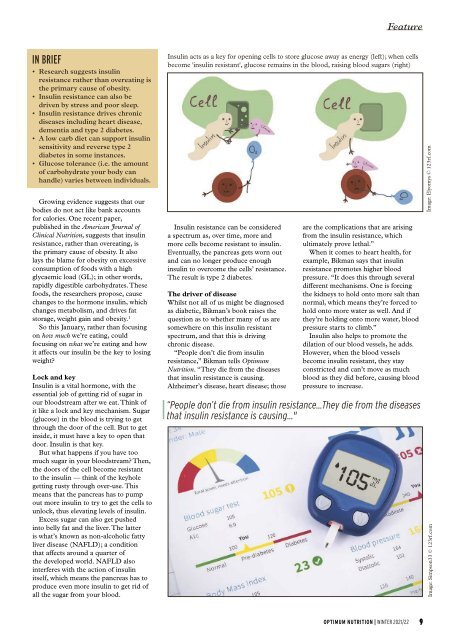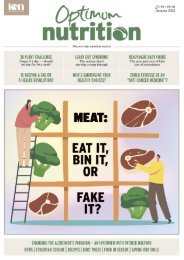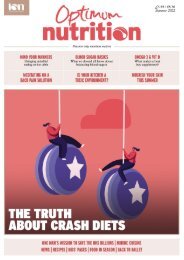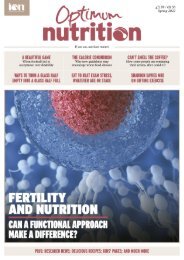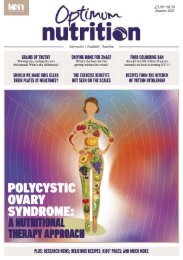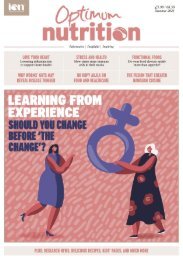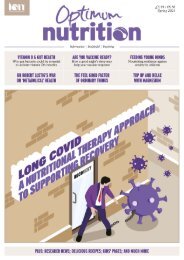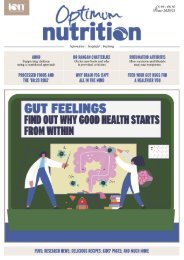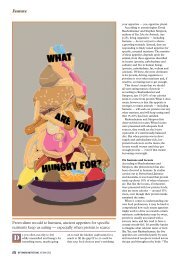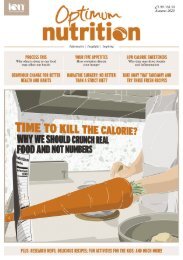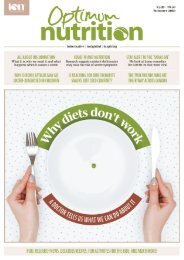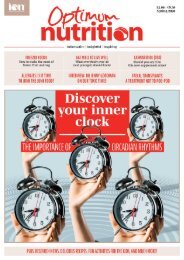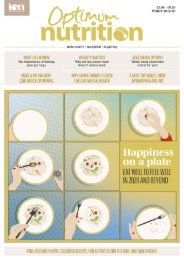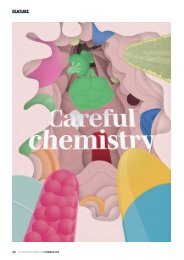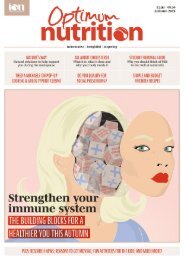Optimum Nutrition - Winter 2021 - PREVIEW
Why rethinking sugar and focusing on insulin resistance could stem an unseen epidemic | A 7-day energy supporting meal plan from registered nutritional therapist Catherine Jeans | Dr Megan Rossi answers questions on gut health and shares recipes from her new book Eat More, Live Well | Sustainable ways to retrain a sweet tooth | Plus research news, recipes, educational kids' pages and much more!
Why rethinking sugar and focusing on insulin resistance could stem an unseen epidemic | A 7-day energy supporting meal plan from registered nutritional therapist Catherine Jeans | Dr Megan Rossi answers questions on gut health and shares recipes from her new book Eat More, Live Well | Sustainable ways to retrain a sweet tooth | Plus research news, recipes, educational kids' pages and much more!
You also want an ePaper? Increase the reach of your titles
YUMPU automatically turns print PDFs into web optimized ePapers that Google loves.
Feature<br />
IN BRIEF<br />
• Research suggests insulin<br />
resistance rather than overeating is<br />
the primary cause of obesity.<br />
• Insulin resistance can also be<br />
driven by stress and poor sleep.<br />
• Insulin resistance drives chronic<br />
diseases including heart disease,<br />
dementia and type 2 diabetes.<br />
• A low carb diet can support insulin<br />
sensitivity and reverse type 2<br />
diabetes in some instances.<br />
• Glucose tolerance (i.e. the amount<br />
of carbohydrate your body can<br />
handle) varies between individuals.<br />
Growing evidence suggests that our<br />
bodies do not act like bank accounts<br />
for calories. One recent paper,<br />
published in the American Journal of<br />
Clinical <strong>Nutrition</strong>, suggests that insulin<br />
resistance, rather than overeating, is<br />
the primary cause of obesity. It also<br />
lays the blame for obesity on excessive<br />
consumption of foods with a high<br />
glycaemic load (GL); in other words,<br />
rapidly digestible carbohydrates. These<br />
foods, the researchers propose, cause<br />
changes to the hormone insulin, which<br />
changes metabolism, and drives fat<br />
storage, weight gain and obesity. 1<br />
So this January, rather than focusing<br />
on how much we’re eating, could<br />
focusing on what we’re eating and how<br />
it affects our insulin be the key to losing<br />
weight?<br />
Lock and key<br />
Insulin is a vital hormone, with the<br />
essential job of getting rid of sugar in<br />
our bloodstream after we eat. Think of<br />
it like a lock and key mechanism. Sugar<br />
(glucose) in the blood is trying to get<br />
through the door of the cell. But to get<br />
inside, it must have a key to open that<br />
door. Insulin is that key.<br />
But what happens if you have too<br />
much sugar in your bloodstream? Then,<br />
the doors of the cell become resistant<br />
to the insulin — think of the keyhole<br />
getting rusty through over-use. This<br />
means that the pancreas has to pump<br />
out more insulin to try to get the cells to<br />
unlock, thus elevating levels of insulin.<br />
Excess sugar can also get pushed<br />
into belly fat and the liver. The latter<br />
is what’s known as non-alcoholic fatty<br />
liver disease (NAFLD); a condition<br />
that affects around a quarter of<br />
the developed world. NAFLD also<br />
interferes with the action of insulin<br />
itself, which means the pancreas has to<br />
produce even more insulin to get rid of<br />
all the sugar from your blood.<br />
Insulin acts as a key for opening cells to store glucose away as energy (left); when cells<br />
become 'insulin resistant', glucose remains in the blood, raising blood sugars (right)<br />
Insulin resistance can be considered<br />
a spectrum as, over time, more and<br />
more cells become resistant to insulin.<br />
Eventually, the pancreas gets worn out<br />
and can no longer produce enough<br />
insulin to overcome the cells’ resistance.<br />
The result is type 2 diabetes.<br />
The driver of disease<br />
Whilst not all of us might be diagnosed<br />
as diabetic, Bikman’s book raises the<br />
question as to whether many of us are<br />
somewhere on this insulin resistant<br />
spectrum, and that this is driving<br />
chronic disease.<br />
“People don’t die from insulin<br />
resistance,” Bikman tells <strong>Optimum</strong><br />
<strong>Nutrition</strong>. “They die from the diseases<br />
that insulin resistance is causing.<br />
Alzheimer’s disease, heart disease; those<br />
are the complications that are arising<br />
from the insulin resistance, which<br />
ultimately prove lethal.”<br />
When it comes to heart health, for<br />
example, Bikman says that insulin<br />
resistance promotes higher blood<br />
pressure. “It does this through several<br />
different mechanisms. One is forcing<br />
the kidneys to hold onto more salt than<br />
normal, which means they’re forced to<br />
hold onto more water as well. And if<br />
they’re holding onto more water, blood<br />
pressure starts to climb.”<br />
Insulin also helps to promote the<br />
dilation of our blood vessels, he adds.<br />
However, when the blood vessels<br />
become insulin resistant, they stay<br />
constricted and can’t move as much<br />
blood as they did before, causing blood<br />
pressure to increase.<br />
“People don’t die from insulin resistance…They die from the diseases<br />
that insulin resistance is causing…"<br />
Image: Elyomys © 123rf.com<br />
Image: Simpson33 © 123rf.com<br />
OPTIMUM NUTRITION | WINTER <strong>2021</strong>/22<br />
9


